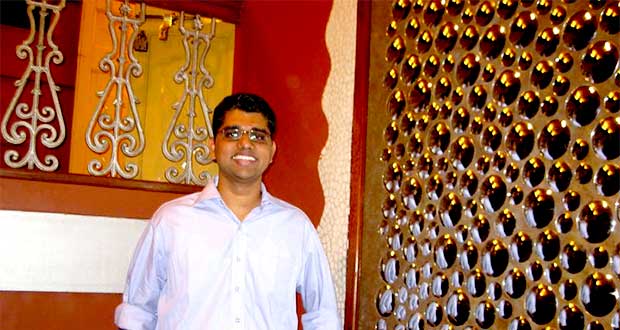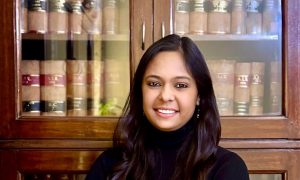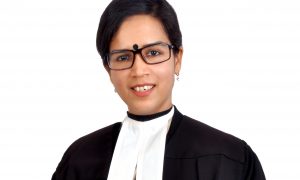Badrinath Srinivasan graduated from SDM Law College, Mangalore, in 2006. Thereafter he pursued an LL.M from WBNUJS, Kolkata. After graduating from WBNUJS he joined Gujarat State Petroleum Corporation Ltd. as a Senior Officer in the legal team. Later in 2010, he switched over to Bharat Heavy Electricals Limited.
In this interview we speak to him about:
- His time at NUJS
- Working at PSUs
- His diverse experience
What brought you into legal studies?
During my school days, I found that I was very good in and was comfortable with social sciences. I used to watch my uncle going to the Madras High Court every day and was probably inspired by him to join law.
Many of my relatives from my mother’s side are lawyers. So I did not face any opposition to legal education, although Law as a profession was new to my parents. Even so, they left the choice to me. My elder brother advised me to choose the science stream in my 11th standard. His advice was very prudent considering that I could always take up law even if I chose Science but I would not be able to choose to do Engineering or Medicine if I took up Commerce or Arts in my 11th standard.
The advice proved very helpful at work as the companies I have worked so far have predominantly been Engineering companies and there have been lots of disputes involving technical matters. It has been relatively easy for me to understand these technical aspects and even research a lot on such aspects considering my background in Science. I am perhaps lucky to have such supportive parents and brother.
What do you have to say about the supposed ‘elite’ tag attached to certain law schools?
I graduated from SDM Law College, Mangalore which is a “Traditional Law School”. I did perform well there. The faculty members and the library staff were extremely supportive. I did my LL.M. from NUJS, Kolkata and therefore I have the experience of studying in a Law School as well. Having been a part of both worlds, I find that following are the limitations in a Traditional Law School:
- Infrastructure- No Westlaw, Manupatra or other legal databases although the library at SDM Law College was awesome.
- Lack of a competitive environment.
- Lack of exposure- In all my five years of law school, I did an internship, did not even read a single judgement in full or a law review article. I hardly participated in moot court competitions. I never realized there was more to Law than a University rank.
- Exposure to Social Sciences- In a Traditional Law School, exposure to social sciences was minimal. Although we studied several social sciences subjects such as history, economics, sociology, there was no rigorous way in which these courses were taught. So we hardly studied these in the way it should be. Classes on these were rather bookish and uninteresting. But the way in which the social sciences were taught in NUJS were extremely refreshing. We had a paper in LL.M. on Law and Social Transformation and there was lot of social sciences in Jurisprudence. In fact, we invited a faculty member who taught Economics for undergraduates to take up Law and Economics in our LL.M. course. These were really great.
There are some benefits of studying in a traditional law school as well. The most important benefit is a better understanding of the society. We had compulsory a legal aid activity in my college at Mangalore where we visited villages nearby to understand the legal issues/ problems people faced. Also, our class consisted of students from diverse backgrounds. The most important quality that I saw among students was humility.
Being from a non-NLU did you find it disadvantageous to establish a well-grounded career?
No. There were no problems at all. Although working in a law firm was not something I wanted, I am not sure if getting into a law firm after my LL.M. at NUJS would have been an easy task.
Why did you decide to pursue LL.M from NUJS?
After completing my LL.B., I had no strong feelings about taking a specific career path in law. I thought that I would probably become an advocate or work as a legal advisor in a company. But I was very interested in research. The idea of research appealed to me. So I wanted to do an LL.M. As regards the choice of college, I wanted to have the National Law School experience. After my 12th standard, I did write the entrance exam for NLSIU and NALSAR. With hardly any preparation, exposure or guidance, I could not get through. So I joined SDM Law College, Mangalore. So, I wanted to pursue the LLM course, and that too from NLSIU/ NUJS/ NALSAR. At that time, I had no clue about LL.M. abroad.
During those days (2006), NUJS’ LLM Entrance used to take place in the last week of January. Therefore, I wrote the NUJS entrance exam first. I couldn’t write the NLS exam, as it coincided with my final year exams. I did write NALSAR. By the time the NALSAR results were out, my LLM classes had already started at NUJS. So I opted not to shift to NALSAR. I don’t regret those two years at NUJS- they were probably the best two years of my life.
How would you describe your legal education?
I did dream and I do dream of contributing at least a little bit to legal reform. While my UG formed the basis of understanding the law, my PG helped in understanding the theoretical aspects of law further and also taught me the methods and functions of critique. My legal education has immensely helped me in my academic endeavours.
People often say what people study in law is totally different from what law is in practice. This is wrong. It means that they have never studied law in the first place. One hardly finds time to learn new things after beginning to work as a lawyer. So whatever we learn in law school is important. Whatever is learnt subsequently is at the cost of the client’s life, liberty or property. Therefore, it is important to learn whatever one can in the Law School. The curriculum in law school is framed such that important aspects of most of the significant laws are covered. Therefore, it is expected that many of the laws studied might not be put into use. However, these will be useful at some point or the other.
How was your experience as an intern at ONGC?
By the time I presented my dissertation and completed my LL.M. Course (March 2008) at NUJS, I had a job as a Senior Officer in the GSPC GROUP. But there were more than two months before my joining date. So I decided to intern at ONGC just to get a hang of how a government undertaking works. Also, GSPC GROUP and ONGC were both petroleum related companies.
At ONGC, hardly any work was allotted to me. So, I had time to go through contracts and case files. I did help them out in a couple of issues concerning increase in service tax and minimum wages in the absence of a condition in the contract covering such a situation. People there were really friendly. I took that opportunity to learn a lot on Crude Oil Sale Agreement and Production Sharing Contracts and the petroleum industry. These things helped me when I started my work at GSPC GROUP. In fact, it helped me out immensely in a negotiation on COSA at GSPC. Also, even before I started working in GSPC, I knew a bit about Production Sharing Contracts and Joint Operating Agreements. So I had a lot of ammunition to impress my new boss there!
What are the top three things you keep in mind while compiling a research work?
Fortunately, I stay pretty close to my office. So I save a lot of time. Also, my interests coincide with the areas in which I deal with at BHEL.
Three things to keep in mind while embarking on a research project:
- Know in detail what the problem/ issue is.
- Before beginning writing the paper, clearly define what you want to say vis-à-vis the problem and how you are going to approach it- structure your research
- Stop wasting time on writing the introduction in the beginning. Write it in the end.
Importantly, one has to be convinced about the idea that he/ she seeks to put forth before the academic community. Another important thing is to have at least one person to review the paper, both from a readability and content perspective. For me it took an equal amount of time to read a paper and review it. Spend a lot of time reviewing the form, structure, and ideas in the paper. Before sending your work to a journal, it is important to give it for review to a faculty member or a subject expert. Also, it would be helpful if the article is read by a person who is very good in grammar. Even reputed authors commit grammatical errors.
What does it take to get one’s article published in a top notch journal?
First read the call for papers and the rules regarding publication (such as citation format, number of co-authors, type of research, etc.). Next, ask your seniors and friends whether the journal is really worth publishing in. While it is good for our ego to have publications in as many journals as possible, it is important to get our writings published in prominent journals. But it is always good to start off one’s research career by writing for a law blog or a journal that does not have extremely stringent publication standards as it is good for our confidence.
As regards reputed journals, glance through a few articles published in the journal to get a hang of the style of writing, citation, structuring, etc. Do a comprehensive literature survey. Talk to a person well versed in the subject. Although such persons cannot substitute a thorough literature survey, they can at least tell you about writings which deal with the subject. It is possible that most of the ideas which we come up with are the ones which have already been published.
How did you get the job as Senior Officer at Gujarat State Petroleum Corporation Ltd.?
During my second year (LL.M.) at NUJS (2007-2008), we decided to invite law firms and companies to our campus for recruitment. Gujarat State Petronet Limited (GSPC GROUP), a Government of Gujarat Undertaking came to NUJS for recruiting us. Due to the efforts of the faculty advisor for Recruitment at NUJS, Mr Anirban Mazumdar, and my classmates at NUJS- Biswajit Pal, Nilanjan Banerjee, Jwala Thapa and MLS Kaarmukilan, we were able to institutionalize the recruitment process for LL.M. at NUJS. GSPC Group said they were willing to recruit LLM students. So they came to NUJS.
If I remember correctly, there were two rounds in the recruitment. The first round had a bit of mathematics, general knowledge and psychometric tests. The second round was an interview. Since GSPC Group’s main business was Petroleum, we read a lot on petroleum laws. Also, we read a lot on current affairs in detail. At that time, the topic that was much spoken about was the subprime crises. We expected questions on the mechanics of how that happened. It really feels good when the preparation for the interview is extensive and questions come from areas which you had prepared. There was actually a question on the subprime crisis!
What were your responsibilities as a Senior Officer of the Secretarial and Legal Department at ONGC?
I was a senior officer in GSPC. I loved commercial law, specifically contracts and arbitration. My dissertation at NUJS was on arbitration law. So, the kind of work I got was drafting, negotiating and vetting contracts, handling arbitrations and litigations. Negotiating contracts was real fun, especially with foreign companies. At GSPC, we had a few huge arbitrations and it was a great learning experience there. I did learn a lot from many of the counsels at Mumbai, Delhi and Ahmedabad. I had the opportunity to be a part of the team briefing senior counsels in all these places. Overall, a great learning experience. Thanks mostly to my boss there Mr. Sandeep Dave, Head of Secretarial and Legal Department, who is probably the best In-House lawyer I have ever known. Working under him, and that too with the excellent work profile at GSPC, is a great thing to do if a person wants to work for a PSU. The salary is not as high as it is in a Central PSU like ONGC but the salary is definitely good and the work is unbelievable.
You are currently an Executive (Law) at Bharat Heavy Electricals Limited. How did the switch from ONGC take place?
I was an intern at ONGC before joining GSPC. While I was working in GSPC, there was an open advertisement for recruitment of Law Officers. For personal reasons, it became necessary for me to shift from Gujarat to South India. So I joined BHEL.
What do PSUs like ONGC and BHEL look for in prospective employees?
Yes. It is totally different. BHEL used to select candidates through CLAT (LLM). Many of the PSUs such as IOC do select candidates through CLAT. Some PSUs like ONGC, GSPC go for campus recruitment. It is important for the Campus Recruitment Committee (by whatever name you call it) to approach them well in advance (through all means of communication, including visiting them personally if required). I have worked in three PSUs and have heard a lot about other PSUs. The best place to learn is in GSPC under Mr. Sandeep Dave. You’d get to negotiate international contracts worth millions of dollars there if you are really good at what you do. To be honest, the salary is not as much as you’d earn in a Central PSU but the learning is definitely worth it.
Does BHEL take interns?
Yes, but BHEL rarely takes law interns.
What are your long term objectives?
In five years, I wish to learn a bit about engineering, finance, economics and statistics. In the long term, I would love to be involved a lot more in arbitration and teach law.
What would be your advice to young law students who wish to join a PSU?
Lots of your time will be spent on obtaining administrative approvals and justifications from the authorities. One should not get bogged down by paper work as these actually are necessary for accountability reasons. There are two areas in which a lawyer can contribute immensely in a PSU:
- There is a great scope for reforming existing practices
- Quick decision making.
While apt legal advice is extremely important in a PSU, aiding quick decision making is more important.


























